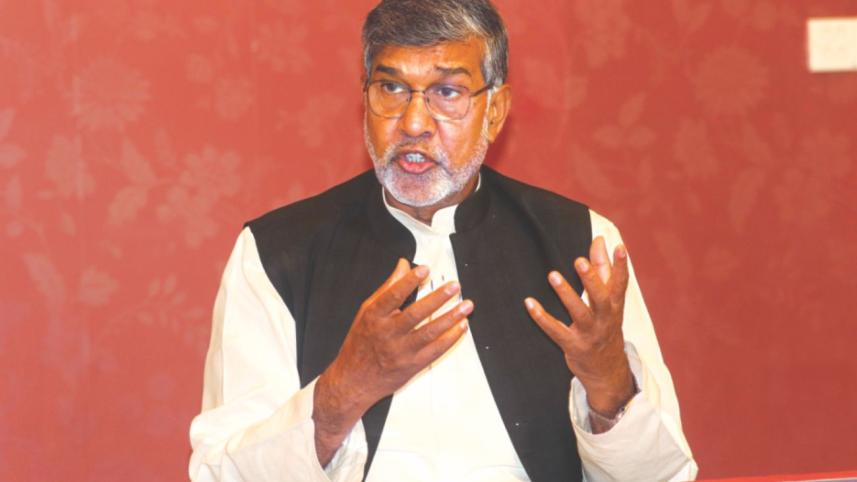Give the youths a voice, confidence

At the age of five, Kailash Satyarthi was deeply disturbed to see another small boy polishing shoes at the school gate. He asked his teacher why that boy was not going to school. Kailash could not understand why some children were different from him.
As he kept looking for the answer, he understood the stark contrast between his life and that of the cobbler's son.
So he started questioning the caste system that maintains social inequalities among people. In protest against that system, he even changed his last name “Sharma” to “Satyarthi” (seeker of truth).
Though he was educated as an electrical engineer, he left his engineering career and initiated a movement against those inequalities, and child rights were his main area of work.
Born and brought up in Vidisha in the Indian state of Madhya Pradesh, Kailash, 63, founded the Bachpan Bachao Andolan (Save the Childhood Movement) in 1980. He has acted to protect the rights of more than 83,000 children from 144 countries. His activism led to framing of new laws and policies at national and global levels.
He won the 2014 Nobel Peace Prize along with Malala Yousafzai of Pakistan. Two years later, Kailash began a global campaign “100 Million for 100 Million”. It was launched in Bangladesh on April 2 this year.
In an exclusive interview with The Daily Star on April 4 when he was in Dhaka to attend the IPU conference, he said that while working for the last three and a half decades, he realised that the conventional ways of work were not impacting people much amid changed socio-economic, technological and political spheres.
So, the idea of his campaign is something different. The idea is bridging the youths.
“Not so many children at any given period in the history have faced the violence they are facing today,” he said.
About 230 million children are now living in conflict-hit countries, while half a billion children are affected either by armed conflict or natural disaster.
Besides, at least 100 million young people are victims of different sorts of violence -- slavery, trafficking, drug and sexual abuses, radicalism and so on. They are deprived of good education, health and care.
On the other hand, better off young people always have a hunger to serve the humanity and bring smiles to others' faces. However, the present political, economic, social and cultural establishments are failing to provide them with meaningful purpose of life, he said.
“The young people feel that they are alienated, left out, their voices not respected or even listened. This is making them frustrated and sometimes intolerant and eventually violent. It is growing globally among the youths.”
He said taking advantage of this situation, fundamentalist forces were brainwashing the youth's minds and radicalising them through the social media.
“So, the generation is getting divided. The left out children are growing in this direction and the children who are better off are going in another direction. That creates social tension and conflicts,” Kailash said.
Here comes the idea of “100 Million for 100 Million”.
“My idea was -- let us try to build the bridges between these two diversely growing constituencies of youth,” he said.
Globally, about three billion people are below the age of 25, and 1.9 billion people are below the age of 18. Out of those 3 billion people, at least 100 million are prepared to do something for others, according to the Nobel laureate.
“Let us give them a voice, confidence. This is the purpose behind it,” Kailash said.
Asked how he could achieve the goal, Kailash said first of all, young people should know about their rights, their responsibilities and issues being faced by children. They should be encouraged to form youth groups in school, college or universities and communities.
“For this we are using the social media, we started a dedicated website and developing mobile apps so that young people could be involved in learning what they can do.”
The youths can do certain things physically. For example, he said, in free time they can go to the neighbourhoods, where children are facing violence. They can raise voice against bullying, children's sexual violence and drug trafficking.
They can also keep an eye on the government policies as in many countries laws are not child-friendly, while government spending is low for education and child protection.
On the other hand, rich countries are also creating problems for children, saying that illegal immigrants would be deported. The life of children of those “illegal immigrants” would be at stake, in that case, Kailash said.
“The young people must raise the voice that this is wrong. That could be done through petitions online,” he said. Youths can also do voluntary work for the children in need -- collecting money or books, shoes, clothes and then distributing those to the people in need.
“So, we are creating that platform for the youths,” Kailash said. Through this, all sections of the society would recognise the power of youths, listen to them and incorporate their decisions in policy-making.
He said many of the NGOs work on street children or indigenous children.
“We will encourage the better off young people to visit those deprived groups and be friends with them. Social media could also work on it in some places. We can use latest technologies, cheap mobile phones, to connect these two constituencies.”
“This is going to be a game changer in the human history,” he said with glittering eyes.




 For all latest news, follow The Daily Star's Google News channel.
For all latest news, follow The Daily Star's Google News channel.
Comments